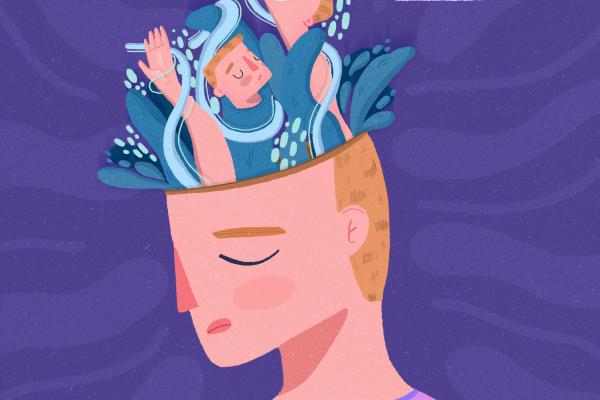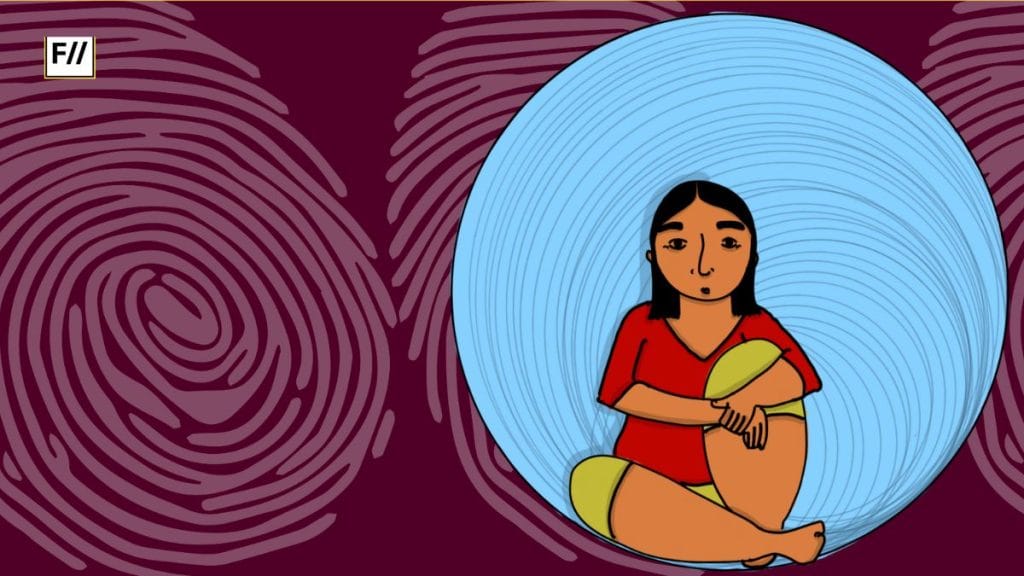I have read multiple articles on ‘How to take care of your mental health’ during this lockdown and as much as I feel relieved about reading about the different kinds of ways I can help myself during this time, I have realized that conversations on mental health isn’t a binary. We are trying to make content that is relatable, however, we often forget that each emotion out there is unique and is a product of different circumstances. So I thought this article should highlight my experience and my conversation with my friend Nishi Ravi who is a practicing psychotherapist.
Before we go ahead with highlighting the snippets of our conversations we would like to acknowledge the fact that we are extremely privileged to study/research and afford therapy.

Mira: This lockdown has been overtly suffocating for me. Sometimes my parents look at me doing nothing sometimes and then they say, “You will never get this luxury of time back in your life.” Every Instagram story I see has to do with someone learning a new skill or finishing a reading list. I read the posts which ask me to “take it easy”, but with a full time job and the anxiety that the days are shorter than the nights, I cannot help but sleep with guilt each day. There’s an everlasting to-do list of things I have to watch, read and word on. I am unable to cope up with it. How do I ensure that I do not have such unrealistic standards kept for myself which I strive to achieve everyday?
Nishi: For years, capitalist ideologies have conditioned us to believe that our predominant concern is making ourselves profitable. The productivity ‘challenges’ across social media, and the need to ‘make the most of’ this seemingly free time puts us under immense pressure to ‘do’. The hustle culture we live in has ingrained the belief that our productivity determines our worth, leading us to constantly rate ourselves based on our accomplishments. While it seems like this lockdown seems to have offered us time, we perhaps need restructure our perspective; and try to look at the bigger picture. Social comparison is supremely misleading and corruptive to our well-being. Additionally, it can feel frustrating to only see the extreme ends of the spectrum: either switching off completely or building a new skill set.
Try to prioritize your time-bound work assignments, household chores, and with respect to all the activities you pursue like reading, writing, or Netflixing: ask yourself if you’re engaging in them as a form of self-care, as a coping mechanism, or simply to keep with what everyone else is doing. Be kind to yourself, but take accountability for your reasoning and actions. Short-sighted goals may be worth focusing on as opposed to the grandiose, overwhelming and ambiguous need to ‘improve yourself’. Allow yourself to re-determine what counts as accomplishments – as ‘small’, ‘non-traditional’, or ‘simple’ as they may seem to you.
Try to identify your privilege, and work towards harnessing it – is there a charity you can donate to? Are there initiatives you can take to check up on those around you? Can you extend your professional role online to offer services for those who may need it? Is there a way to support causes and industries you believe in? How can you educate and sensitize yourself and those around you?
Mira: I have this tendency to ‘make myself a project’ and by that I mean that I have this constant need to ‘improve myself’ and ‘be the better version’ from yesterday. I cannot help but think of time as currency which I’m wasting each day. Is there anything to ‘achieve’ by the end of this lockdown, anyway?
Nishi: As a psychotherapist, I am curious what your personal definition of ‘improvement’ is… Are you striving for improvement or running away from what you are experiencing right now?
As mentioned earlier, society has romanticized and lauded the ‘rise and grind’ culture, placing workaholism at the frontline of ‘desirable’ qualities in a professional. It is hard to deprogram the compulsive need to commodify and account for every moment. We are so used to quickly minimizing our exhaustion from coping, we instinctively punish ourselves for being ‘unproductive’.
What would it look like to rewrite that narrative of needing to improve yourself? What if focusing on your mental health, engaging in self-care, and being compassionate to yourself is what you currently need to give yourself space to do?
Flattening the curve by staying home may be difficult to consider as an individual ‘conventional’ achievement to you, but healthcare workers and essential employees would vehemently disagree! “Improvement” is a highly subjective concept. Your growth can be personal or professional – both these aspects deeply impact each other. You are human, with a dynamic emotional landscape, not a static, predictable project that you constantly edit. Whatever you come out of this lockdown with is an achievement – be it health, relationships, skills, awareness, or…yourself. Preservation takes precedence over creation right now.
Mira: As a savarna woman brought up in cities, I acknowledge the fact that the ‘miseries’ are much less intense compared to women who belong to rural areas, work as migrant labourers in cities. Each day I read one new article or watch a video on how it’s much tougher for people out there who cannot afford to use their vessels and plates to ‘bang in their balcony’. This one article on how a man and a dog shared a spilled milk in Agra due to the desperation for food had me feel extremely guilty of everything that I have, especially the excess content of it. I feel helpless during this time, like stuck between the inability to do something and the want to do more than I can. How do I tackle this?
Nishi: Reading the news about migrant workers, those below the poverty line, and the difficulty our own domestic help face can be jarring and difficult to digest. Allow yourself to acknowledge and lean into your discomfort, and try to understand why you feel it. You aren’t just experiencing your individual guilt – you are possibly carrying the intergenerational and collective guilt from centuries of oppression, power imbalance, and inequality. Any society which allows people to scrounge for food off the ground whilst others watch from ivory towers has monumentally failed. It is imperative, now more than ever, to take a closer look at our history and the miasma of inequity, social injustice, and hegemony that surrounds our bubble of privilege. Ultimately, we are not all in the same boat – just the same storm.
While you may have not ‘asked’ for the power that is affixed to your savarna status, try not to feel so overwhelmed with everything you feel you need to do and end up unable to actually do at all. Guilt without action can feel extraordinarily torturous and is a barricade in the quest for change.
Try to identify your privilege, and work towards harnessing it – is there a charity you can donate to? Are there initiatives you can take to check up on those around you? Can you extend your professional role online to offer services for those who may need it? Is there a way to support causes and industries you believe in? How can you educate and sensitize yourself and those around you?
Above all, try to remember that someone else’s suffering does not negate your own experiences. Give yourself permission to feel your despair without the constant burden of guilt. You are no good to others if you are no good to yourself.
The helplessness and vulnerability you may be feeling right now can trigger your past feelings of powerlessness when you got job rejections, experienced interpersonal conflict, and were emotionally abused. Try to challenge this helplessness: talk about it with a therapist, reach out and reconnect with friends, take time to self-reflect on your experiences: journal, meditate, paint, read – any medium that allows you to authentically explore and express your thoughts.
Mira: In such times I catch myself spiralling. I think about all the moments in the past where I’ve been gaslighted, that one fight I had with my friend in college, all the times I could have said something back but I couldn’t. Quite recently, I caught myself re-reading all my job rejection emails and other disturbing messages. Moreover, I always have thought that if I’m ‘busy’ enough during the day I wouldn’t feel the need to think about such things or constantly remind myself of a familiar pain. Does more time in my hands equate to more opportunities to completely destroy all the work I’ve done so far with my mental health?
Nishi: Healing is not a linear process. Catharsis is not a neat, overnight affair.
We’ve glorified quotes like ‘The idle mind is the devil’s workshop.’ and are conditioned to feel soothed by being cognitively taxed all the time. When you constantly keep yourself busy and distracted, you don’t even have the time or mental energy to confront and reflect on your past experiences. This form of emotional dysregulation becomes normalized. The past traumas that resurface now could be your brain’s attempt at regulation, now that the varying filters of distraction no longer exist.
The helplessness and vulnerability you may be feeling right now can trigger your past feelings of powerlessness when you got job rejections, experienced interpersonal conflict, and were emotionally abused. Try to challenge this helplessness: talk about it with a therapist, reach out and reconnect with friends, take time to self-reflect on your experiences: journal, meditate, paint, read – any medium that allows you to authentically explore and express your thoughts.
Also read: Abortion Amid Lockdown: How Can The State Take Responsibility?
Your struggle isn’t indicative of failure. Your ‘bad days’ are as valid as your good ones in your healing process, and do not have any bearing on your own strength and resilience.
Whatever reactions you have: frustration, anger, fear, sadness, powerlessness – they are all normal responses to an abnormal situation. There isn’t a single correct answer to what healing looks like. Maybe more time on your hands equates to more opportunities to give yourself the internal closure you have always deserved but could not get from external sources.
Mira: I also cannot help but think about how the world is going to completely change after this pandemic. How social interactions will change after this lockdown is over, how different and weird it will be to interact with my friends the first time we all will get lunch together after this. A close friend of mine lost his job and is searching for new ones. And I know and understand that people have worse situations out there. I cannot help but ‘count my blessings’ and be happy that my turn hasn’t come yet. It is surely an empty feeling. How do I cope with that?
Nishi: The world as you know it may never be the same – and that is scary. Most change is! When impacted by such turbulent circumstances, our minds can often go into overdrive. Intrusive and impulsive thoughts, catastrophic thinking, self-predictions, feelings of overwhelming anxiety, and restlessness are all common catalysts that can paralyze and numb us.
It may be hard to come to terms with just how inconsequential our plans seem in the grand scheme of things. Some of your goals which you spent months achieving may feel like they’ve crashed. Vacations, jobs, reunions, degrees, weddings – all these life events may feel like they’ve come to a full stop. There’s a sudden unconscious realization that too much future planning may be futile, and your mind must now re-adjust to plan short-term survival as opposed to long-term living. Without realizing it, we’ve had a steep drop down to the lower rungs of Maslow’s Pyramid. Give yourself time to readjust.
Try to isolate and break down your thoughts to avoid emotionally overloading yourself. Explore what about them makes you feel hollow, and identify simple, small steps to rationalize and counter them individually. Take the time to grieve your losses, whether temporary or long-standing. It may help to reach out to friends, and share the struggles of the ambiguity, and the fear of how your relationships may be affected. Reflect on your uncertainties, detox from the news and media, reach out to friends, talk to a therapist, and try to ground yourself in the present and what will help you right now. Maybe your full stop is just a comma.
Also read: Covid-19 Lockdown: The Aroma Of Patriarchy From Indian Kitchens
If you are someone out there who feels the same way, I encourage you to write it out. To publish it if you can and be more vulnerable. You needn’t relate to any of the content given here but you can write about your experiences and your coping mechanisms- not only does that make you feel better, it helps someone else with similar experience, feel better too.
Nishi Ravi is a COSCA-qualified psychotherapist, trained at the University of Edinburgh, Scotland. Currently based in Chennai, she is independently managing her own private practice, NRPsychotherap. You can reach out to Nishi directly at nishiravipsychotherapy@gmail.com.
If you ever feel the need you can also look at these lists:
- List of Mental health practitioners with nominal fee
- Crowdsources list of Non-Judgemental mental health practitioners in India
No feeling can be discounted, no emotion can be ignored. This lockdown, let us help each other to overcome these issues, one hour at a time.
PS: We passed the Bechdel Test!
Featured Image Source: Unicef
About the author(s)
Works as a Policy Officer at the Centre for Internet and Society. Views are personal.





A great article! It’s a slow process, but hopefully more people are realizing that mental health is at least as important as physical health.
Very very helpful! Thank you for sharing this.
Great article, made me reflect on the influences of the current situation on my emotions. Thank you for posting it!
Good read. Nishi seems like a very empathetic and well-read counsellor.
Highly insightful article!
Fantastic article! So helpful in these times.
Such an insightful, cathartic read. Well-articulated. Thank you FII, Mira, and Nishi for sharing.
I realize how stressed I’ve been feeling, and this article really helped put things into perspective. Eye-opening and well-researched read,
Such a great article. Made me reflect on current circumstances….especially the man from Agra….well done…
Reflective and good interview.
Insightful article! It is important to break the stigma around mental health so we can be healthier, especially in these times.
This shed light on how toxic our own thinking can be and how this ultimately impacts us. Mental health needs to be taken more seriously to avoid severe repercussions in the future.